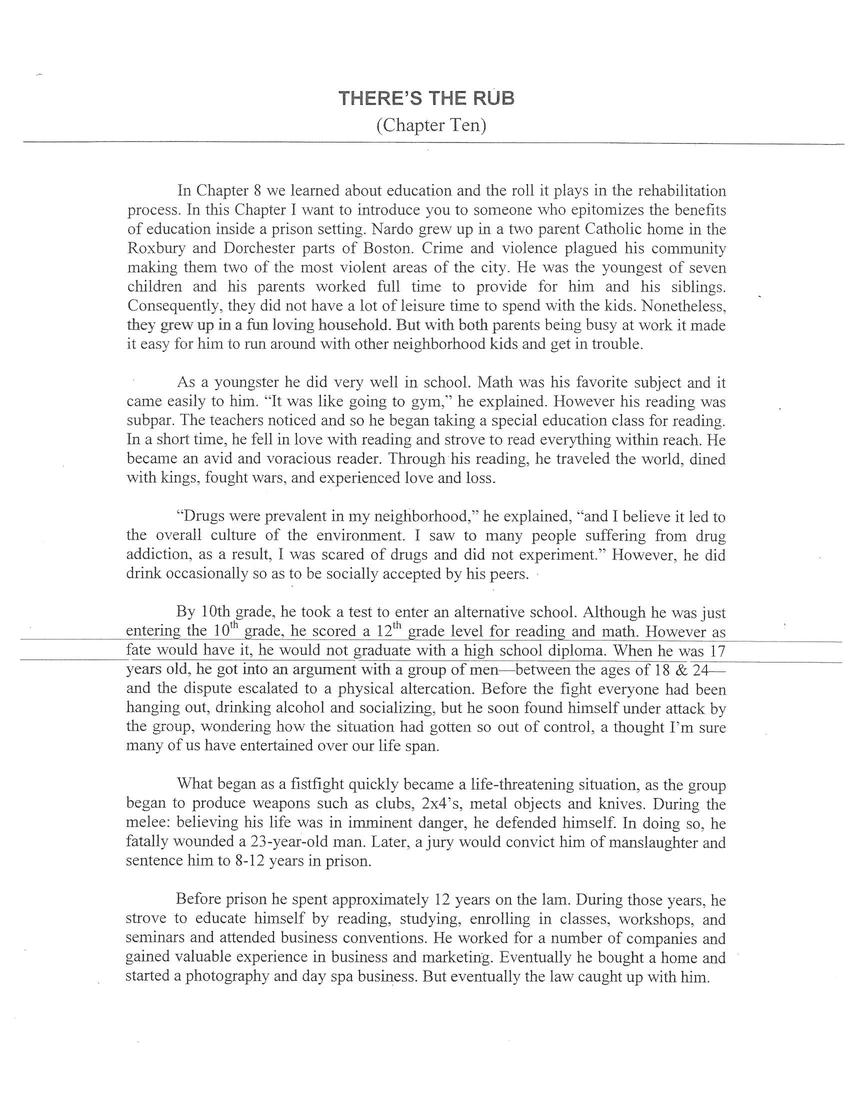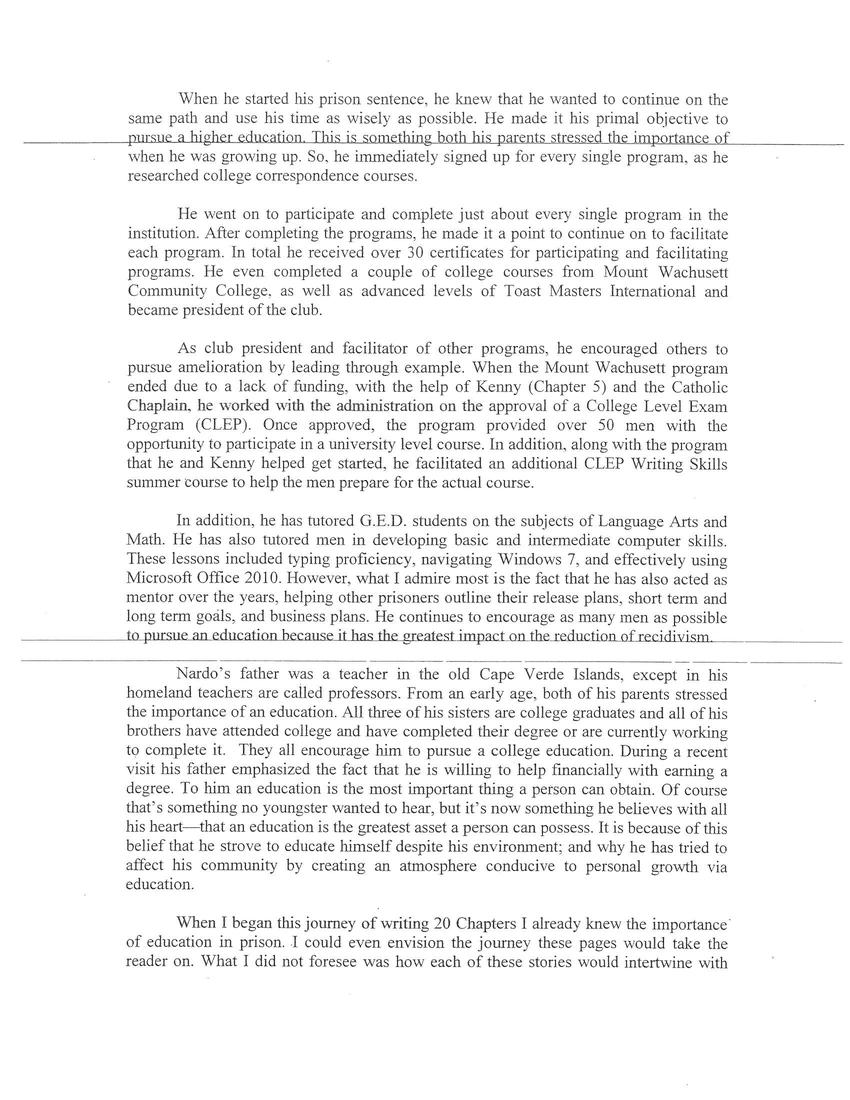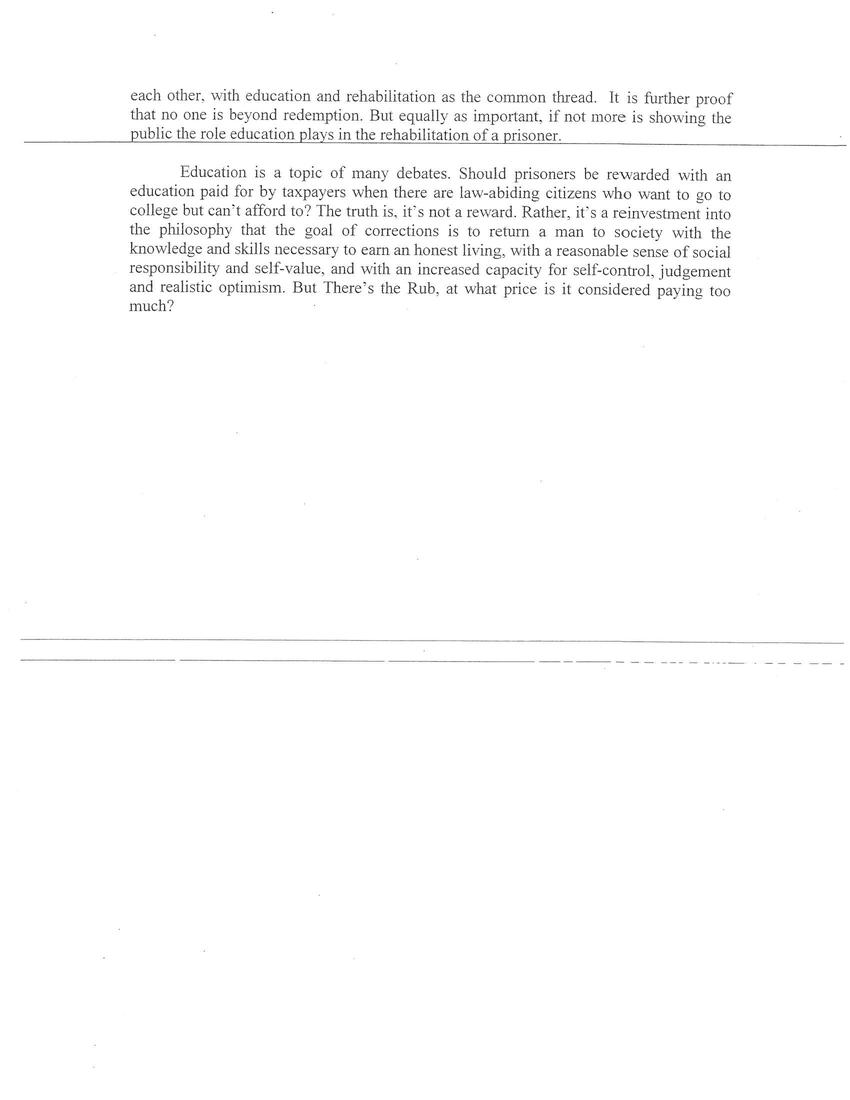
Transcription
There's the Rub (Chapter Ten)
In Chapter 8 we learned about education and the role it plays in the rehabilitation process. In this Chapter I want to introduce you to someone who epitomizes the benefits of education inside a prison setting. Nardo grew up in a two-parent Catholic home in the Roxbury and Dorchester parts of Boston. Crime and violence plagued his community, making them two of the most violent areas of the city. He was the yongest of seven children, and his parents worked full time to provide for him and his siblings. Consequently, they did not have a lot of leisure time to spend with the kids. Nonetheless, they grew up in a fun-loving household. But with both parents being busy at work it made it easy for him to run around with other neighbourhood kids and get in trouble.
As a youngster he did very well in school. Math was his favourite subject and it came easily to him. 'It was like going to the gym', he explained. However, his reading was subpar. The teachers noticed and so he began taking a special education class for reading. In a short time, he fell in love with reading and strove to read everything within reach. He became an avid and voracious reader. Through his reading, he travelled the world, dined with kings, fought wars, and experienced love and loss.
'Drugs were prevalent in my neighborhood', he explained, 'and I believe it led to the overall culture of the environment. I saw too many people suffering from drug addiction, and as a result, I was scared of drugs and did not experiment.' However, he did drink occasionally so as to be socially accepted by his peers.
By 10th Grade, he took a test to enter an alternative school. Although he was just entering 10th Grade, he scored a 12th Grade level for reading and math. However, as fate would have it, he would not graduate with a high school diploma. When he was 17 years old, he got into an argument with a group of men - between the ages of 18 and 24 - and the dispute escalated into a physical altercation. Before the fight, everyone had been hanging out, drinking alcohol and socialising, but he soon foud himself under attack by the group, wondering how the situation had gotten so out of control, a thought I'm sure many of us have entertained over out life span.
What began as a fist-fight quickly became a life-threatening situation, as the group began to produce weapons, such as clubs, 2x4s, metal objects and knives. During the melee, believing his life was in imminent danger, he defended himself. In doing so, he fatally wounded a 23-year-old man. Later, a jury would convict him of manslaughter and sentence him to 8-12 years in prison.
Before prison he spent approximately 12 years on the lam. During those years, he strove to educate himself by reading, studying, enrolling in classes, workshops and seminars and attended business conventions. He worked for a number of companies and gained valuable experience in business and marketing. Eventually he bought a home and started a photography and day spa business. But eventually the law caught up with him.
When he started his prison sentance, he knew that he wanted to continue on the same path and use his time as wisely as possible. He made it his primary objective to persue a higher education. This is something both his parents stressed the importance of when he was growing up. So he immediately signed up for every single program, and he researched college correspondence courses.
He went on to participate and complete just about every single program in the institution. After completing the programs, he made it a point to continue on to facilitate each program. In total he received over 30 certificates for participating and facilitating programs. He even completed a couple of college courses from Mount Wachusett Community College, as well as advanced levels of Toast Masters International and became president of the club.
As club president and facilitator of other programs, he encouraged others to persue amelioration by leading through example. When the Mount Wachusett program ended due to lack of funding, with the help of Kenny (Chapter 5) and the Catholic Chaplain, he worked with the adminitration on the approval of a College Level Exam Program (CLEP). Once approved, the program provided over 50 men with the opportunity to participate in a university level course. In addition, along with the program that he and Kenny helped get started, he facilitated an additional CLEP Writing Skills summer course to help men prepare for the actual course.
In addition, he has tutored GED students on the subjects of Language Arts and Math. He has also tutored men in developing basic and intermediate computer skills. These lessons included typing proficiency, navigating Windows 7, and effectively using Microsoft Office 2010. However, what I admire most is the fact that he has also acted as a mentor over the years, helping other prisoners outline their release plans, short term and long term goals, and business plans. He continues to encourage as many men as possible to persue an education because it has the greatest impact on the reduction of recidivism.
Nardo's father was a teacher in the old Cape Verde Islands, except in his homeland teachers are called professors. From an early age, both of his parents stressed the importance of education. All three of his sisters are college graduates and all of his brothers have attended college and have completed their degree or are currently working to complete it. They all encourage him to persue a college education. During a recent visit his father emphasised the fact that he is willing to help financially with earning a degree. To him, an education is the most important thing a person can obtain. Of course, that's something no youngster wanted to hear, but now it's something he believes with all his heart - than an education is the greatest asset a person can possess. It is because of this belief that he strove to educate himself despite his environment; and why he has tried to affect his community by creating an atmosphere conducive to personal growth via education.
When I began this journey of writing 20 Chapters, I already knew the importance of education in prison. I could even envision the journey these pages would take the reader on. What I did not foresee was how each of these stories would intertwine with each other, with education and rehabilitation as the common thread. It is further proof that no one is beyond redemption. But equally as important, if not more, is showing the public the role education plays in the rehabilitation of prisoners.
Education is a topic of many debates. Should prisoners be rewarded with an education paid for by taxpayers when there are law-abiding citizens who want to go to college but can't afford to? The true is, it's not a reward. Rather, it's a reinvestment into the philosophy that the goal of corrections is to return a man to society with the knowledge and skills necessary to earn an honest living, with a respectable sense of social responsibility and self value, and with an increased capacity for self-control, judgement and realistic optimism. But There's the Rub, at what price it is considered paying too much?
Other posts by this author
|
2017 jun 24

|
2017 jun 24

|
2017 jun 24

|
2017 jun 24

|
2017 jun 18

|
2017 jun 15

|
More... |




Replies